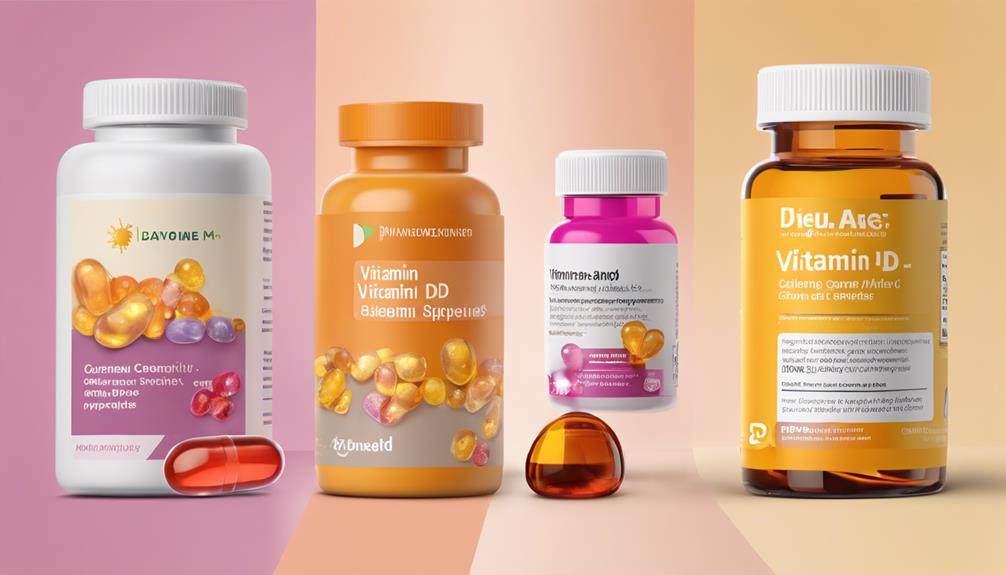The Role of Vitamin D in Women’s Health: Best Supplements to Take
If you didn't know, Vitamin D plays a crucial role in women's health, impacting various aspects of well-being. But have you ever wondered which Vitamin D supplement is best suited for you? In this discussion, we will explore the importance of Vitamin D in supporting women's health and highlight the top recommended supplements that can aid in achieving optimal health outcomes. Stay tuned to discover the key factors to consider when selecting the right Vitamin D supplement for your needs.
Importance of Vitamin D for Women
When it comes to women's health, understanding the importance of Vitamin D is crucial. Vitamin D plays a significant role in maintaining bone health and hormone regulation, making it an essential nutrient for women of all ages.
Adequate levels of Vitamin D are vital for the absorption of calcium, which is essential for building and maintaining strong bones. Without enough Vitamin D, the body struggles to absorb calcium efficiently, leading to weakened bones and an increased risk of fractures, especially in postmenopausal women.
Additionally, Vitamin D plays a crucial role in hormone regulation, influencing the production of estrogen and progesterone, which are essential for reproductive health and overall well-being in women.
Ensuring you have sufficient Vitamin D levels through sunlight exposure, diet, or supplements can contribute to optimal bone health and hormonal balance, ultimately supporting your overall health and vitality.
Sunlight Exposure and Vitamin D
Understanding the impact of sunlight exposure on Vitamin D levels is key in maintaining optimal health, particularly for women. Sunlight is a primary source of Vitamin D, crucial for bone health, immune function, and overall well-being. However, the use of sunscreen can limit the skin's ability to produce Vitamin D, leading to potential deficiencies. It's important to strike a balance between protecting your skin from harmful UV rays and allowing for adequate Vitamin D synthesis.
For women with indoor lifestyles, such as those working long hours in offices or staying predominantly indoors, the risk of Vitamin D deficiency is heightened. Lack of sunlight exposure can contribute to low Vitamin D levels, potentially increasing the likelihood of various health issues. To counteract this, consider spending time outdoors during peak sunlight hours, without sunscreen for short periods, to help boost your Vitamin D levels.
Additionally, incorporating Vitamin D supplements into your routine may be beneficial in maintaining adequate levels, especially if natural sunlight exposure is limited.
Health Benefits of Vitamin D
To fully grasp the importance of Vitamin D in women's health, it's essential to acknowledge the array of significant health benefits associated with this crucial nutrient.
Vitamin D plays a vital role in maintaining optimal bone density, which is especially important for women, as they're more prone to conditions like osteoporosis. Adequate vitamin D levels help in the absorption of calcium, promoting bone strength and reducing the risk of fractures.
Furthermore, Vitamin D is a key player in supporting immune function. It helps regulate the immune system, aiding in the prevention of autoimmune diseases and reducing the risk of infections. Studies have shown a correlation between low levels of vitamin D and increased susceptibility to illnesses.
Recommended Daily Intake
Having understood the significant health benefits associated with Vitamin D, it's imperative to now focus on the recommended daily intake of this essential nutrient. Adequate levels of Vitamin D are crucial for women's health, impacting aspects such as bone strength, immune function, and hormone regulation.
The recommended daily intake of Vitamin D varies depending on factors such as age, sun exposure, and overall health status. For most women, it's generally recommended to aim for a daily intake of around 600-800 IU (International Units) of Vitamin D. However, some experts suggest that higher doses may be necessary to achieve optimal levels, especially for those with limited sun exposure or conditions affecting Vitamin D absorption.
It's important to note that excessive intake of Vitamin D can lead to toxicity, so it's advisable to consult with a healthcare provider to determine the appropriate dosage for individual needs. Ensuring adequate Vitamin D levels can positively impact women's health and overall well-being.
Best Vitamin D Supplements
When choosing the best Vitamin D supplements to support your health, it is essential to consider factors such as quality, dosage, and absorption rates. To ensure optimal benefits, look for supplements with high absorption rates and follow recommended dosage guidelines. Here are a few top choices that are well-regarded for their quality and effectiveness:
| Supplement Brand | Dosage |
|---|---|
| NatureWise Vitamin D3 | 5000 IU |
| NOW Supplements Vitamin D3 | 2000 IU |
| Garden of Life mykind Organics Vegan D3 | 1000 IU |
These supplements offer varying dosages to accommodate different needs, but always consult with your healthcare provider to determine the right dosage for you. Remember, absorption rates play a crucial role in how effectively your body can utilize Vitamin D. By selecting supplements with good absorption rates and following recommended dosage recommendations, you can better support your overall health and well-being.
Factors Affecting Absorption
Factors affecting the absorption of Vitamin D in the body can significantly impact its effectiveness and health benefits. When it comes to dietary sources, consuming foods rich in fat along with Vitamin D can enhance its absorption. Pairing Vitamin D with healthy fats like avocado or nuts can aid in its uptake by the body.
Moreover, the presence of skin pigmentation plays a crucial role in Vitamin D absorption. Individuals with darker skin tones require more sun exposure to produce an adequate amount of Vitamin D compared to those with lighter skin tones. This is due to the higher levels of melanin, which can act as a natural sunscreen and reduce the synthesis of Vitamin D in the skin.
Understanding these factors and making informed choices about dietary intake and sun exposure can optimize the absorption of Vitamin D in your body, ensuring you reap its numerous health benefits.
Choosing the Right Form
Selecting the appropriate form of Vitamin D supplement is essential to ensure optimal absorption and effectiveness in supporting women's health. When choosing a Vitamin D supplement, there are various formulation options available, each with its own advantages. Here are some common formulation options along with dosage recommendations to consider:
| Formulation | Dosage Recommendations |
|---|---|
| Vitamin D3 | 600-800 IU per day |
| Vitamin D2 | 50,000 IU weekly |
| Vitamin D drops | 1,000 IU per drop |
| Vitamin D capsules | 1,000-2,000 IU daily |
Vitamin D3 is the preferred form for supplementation due to its higher bioavailability and effectiveness in raising blood levels. Dosage recommendations vary depending on individual needs and health conditions, so it is crucial to consult with a healthcare provider before starting any new supplement regimen. By selecting the right form and following appropriate dosage guidelines, you can ensure that your Vitamin D supplementation effectively supports your overall health and well-being.
Supplementing for Optimal Health
For optimal health, incorporating Vitamin D supplementation into your daily routine can play a crucial role in supporting various aspects of your well-being. When considering supplementing with Vitamin D, it's essential to be informed about dosage recommendations and absorption rates to maximize its benefits. Here are three key points to keep in mind:
- Dosage Recommendations: The Recommended Dietary Allowance (RDA) for Vitamin D varies with age and life stage. Adults up to age 70 should aim for 600-800 IU daily, while those over 70 may need 800-1000 IU to maintain optimal levels.
- Absorption Rates: Vitamin D is a fat-soluble vitamin, meaning it's best absorbed when taken with a meal containing healthy fats. This can enhance its absorption and utilization in the body.
- Dietary Sources and Potential Risks: While sunlight and fortified foods provide Vitamin D, supplementation may be necessary for many individuals. However, excessive intake can lead to toxicity, so it's crucial to consult with a healthcare provider to determine the right dosage for you.
Frequently Asked Questions
Can Vitamin D Supplements Help With Symptoms of Menopause?
Yes, vitamin D supplements can improve bone density and potentially alleviate hot flashes during menopause. Research suggests that adequate vitamin D levels may help manage menopausal symptoms, contributing to overall women's health during this phase.
Are There Any Risks Associated With Taking Too Much Vitamin D?
Avoid excessive intake of vitamin D to dodge Vitamin D toxicity. Monitor Vitamin D levels regularly. High doses can lead to hypercalcemia. Consult a healthcare provider for guidance on safe supplementation to maintain optimal health.
Can Vitamin D Deficiency Affect Fertility in Women?
When vitamin D levels are low, hormonal balance can be disrupted, potentially affecting reproductive health. Ensuring adequate vitamin D intake through supplements or sunlight exposure may support fertility in women by maintaining optimal hormone levels.
Should Pregnant Women Take Higher Doses of Vitamin D?
When pregnant, you should consider higher vitamin D doses for better absorption and pregnancy benefits. It's crucial for your health and your baby's development. Consult your healthcare provider for the best supplement plan.
Can Vitamin D Supplements Interact With Other Medications or Supplements?
When taking vitamin D supplements, be cautious about potential drug interactions. Always consult your healthcare provider to ensure supplement safety. Some medications or other supplements may affect how your body absorbs or processes vitamin D.
Conclusion
In conclusion, ensuring adequate Vitamin D intake is crucial for women's health. While some may argue that sunlight exposure alone is sufficient, factors like skin tone, geographical location, and lifestyle habits can impact Vitamin D levels. By choosing the right Vitamin D supplement, such as NatureWise or NOW Supplements, women can support their bone health, hormone regulation, and immune function. Consult with a healthcare provider to determine the best supplement and dosage for optimal well-being.













